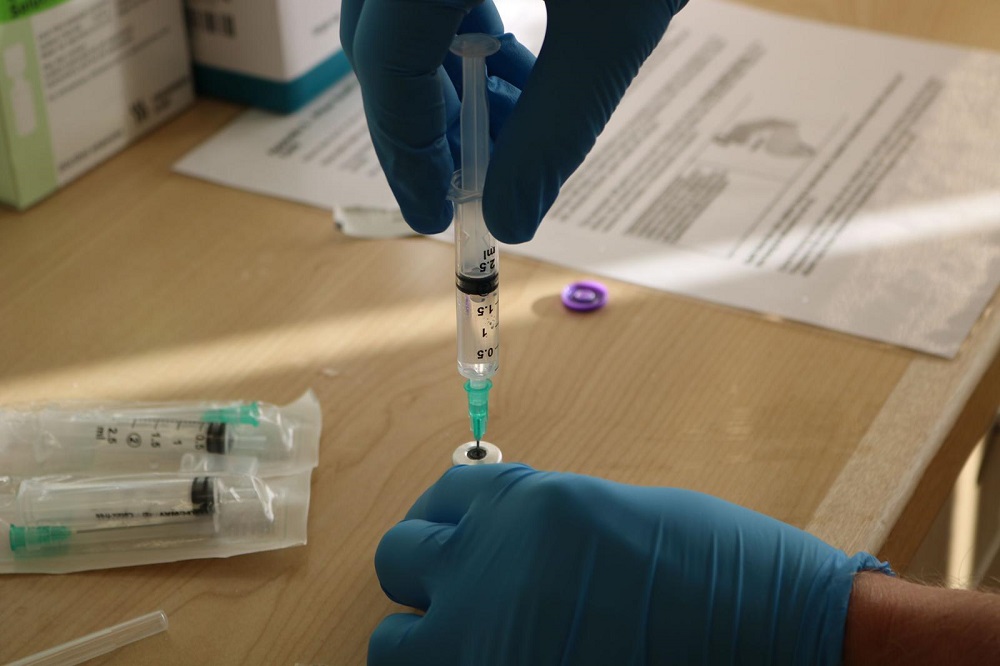News in brief: Minister defends age-based approach to vaccine rollout

Health Minister Vaughan Gething has defended the decisions to prioritise age over occupation across the next phase of the Covid vaccine rollout and says on that basis over half of key workers in Wales will receive the vaccine in the coming weeks.
There have been calls in recent weeks for first responders, teachers, transport workers and people working in the retail sector to be given precedence but the Joint Committee on Vaccination and Immunisation that advises the governments of all four UK nations, says age remains the most significant risk factor for people that contract Covid-19.
Last week the government confirmed people in their 40s will be next in line to get the coronavirus vaccine under the plan to vaccinate all adults in Wales by the end of July.
“In recommending an age-based approach, the JCVI noted the importance of other factors, specifically gender, ethnicity and socioeconomic status. We will take account of the need for clear, trusted and targeted information on these factors within our communications and deployment arrangements for phase 2,” Mr Gething told the Senedd.
“We know that over half of key workers are aged over 40. Over half of our key workers will therefore either be offered vaccination as part of the current phase of the programme or will be called for vaccination as part of the first priority group recommended by the JCVI for phase 2—those people aged between 40 and 49.
‘Disappointment’
“I recognise there’ll be some disappointment around this—those working in education, childcare and the police service, and in the transport sector, for example. I’ve also heard the case made for retail workers and postal workers, all of whom have worked through the height of the pandemic. But, put simply, the JCVI advise us that an age-based approach is the simplest, the quickest to operationalise and deliver, and the fairest approach to the population as a whole.”
Over one million people in Wales, close to 30% of the total population, have received at least one does of vaccine since the start of the mass vaccination programme on 8 December.
Public Health Wales has reported 12 further deaths due to Covid-19 and 208 new cases of the virus in today’s update.
Four of the newly reported deaths were in the Cwm Taf Morgannwg health board area. Cardiff and Vale recorded three further deaths and there were two deaths in Swansea Bay and one in each of Aneurin Bevan, Betsi Cadwaladr and Hywel Dda.
15 of 22 local authorities recorded single figure totals for the number of new positive tests for the virus.
Caerphilly reported 20 new cases, the highest in Wales over the last 24 hours, and there were also 18 new cases in Newport and 17 in Wrexham.
Gwynedd now has the highest weekly case rate in Wales at 92.3 per 100,000 people. It also has a positive test rate of 9% per 100,000 tests for the week, also the highest in the country.
Overall, the national case rate has declined to 57.1 from 60.3 yesterday and the positive test proportion has fallen from 5.9% to 5.8%.
124,781 people in Wales have now been fully vaccinated, having received two doses,. That’s 3.78% of the adult population.

New round of support for hospitality, leisure and tourism businesses announced
The Welsh Government has announced a further £30 million for hospitality, leisure and tourism businesses affected by the ongoing coronavirus restrictions.
It has also confirmed that pending the outcome of the next review on 12 March, a further £150 million in grants could be made available to firms, including micro businesses, through the Welsh Government’s Non-Domestic Rates (NDR) scheme if restrictions are extended.
The latest round of the government’s Economic Resilience Fund will see £30m of targeted support being made available to support small, medium and large businesses in the hospitality, leisure and tourism sectors as well as related supply chain businesses and is targeted at businesses employing ten or more staff.
If restrictions are extended at the review next week, all businesses in the hospitality, tourism, leisure and non-essential retail sectors that pay non-domestic rates, will be eligible for an additional payment of up to £5,000 regardless of the number of employees they have.
Businesses in the hospitality, tourism and leisure sectors can access the eligibility checker and calculator on the Business Wales website to help them work out what support they can expect to qualify for in this latest round and the information required to make an application.
Minister for Finance, Rebecca Evans, said: ”The pandemic has had a disproportionate effect on the hospitality, leisure and tourism sectors and the people it employs.
“This new fund, and our provision of additional funding should restrictions be extended, responds to the latest phase of the pandemic and signifies our continued commitment to the sector, helping them to survive the toughest of times until they are in a position to safely reopen their doors again.”

Section of River Wye fails to meet Welsh environmental standards
Carmelo Garcia, local democracy reporter
A part of the River Wye is failing to meet environmental standards due to the level of phosphates in the water, according to a Welsh Government body.
Natural Resources Wales research shows the section from Walford Brook to Bigsweir Bridge is failing.
That part of the river straddles the border between England and Wales but is not seen as failing by Natural England and the Environment Agency.
The guidance for setting water quality targets in rivers that are designated for nature conservation is the same in England and Wales.
But different targets are set depending on the characteristics of the river and the technical feasibility of achieving the targets in each section.
There are several waterbodies which span the border and have both English and Welsh targets.
But the section from Walford Brook to Bigsweir Bridge is the only one where the targets do not align.
Natural England and the Environment Agency say they will be working with Natural Resources Wales to identify shared targets in all shared waterbodies, as part of a review of English targets.
Targets
“The River Wye is passing phosphate targets for most of the length in England, with the major exception of the River Lugg tributary where we are currently focussing efforts to reduce phosphate inputs,” a Natural England spokesperson said.
“The English and Welsh targets align in all cross-border waterbodies except one. We are working closely with Natural Resources Wales to understand the differences in our targets and analysis to ensure we have the best understanding of current and long term trends.
“Discussions around site nutrient targets are ongoing between the Environment Agency and Natural England as part of River Basin Management Planning for the River Wye and other designated sites.”
High levels of phosphates in local rivers are believed to be due to run-off from farming and sewage treatment works.

Plaid Cymru welcomes school return proposals
Plaid Cymru Shadow Minister for Education, Sian Gwenllian MS, has welcomed the announcement that pupils in years 7, 8 and 9 could return to school before Easter.
Education Minister Kirsty Williams confirmed the proposals this morning, however the plans will be subject to the regular three-week review of coronavirus regulations by the Welsh Government on Friday 12 March.
The planned return of younger secondary school pupils would be in addition to all primary pupils, who are expected to return from 15 March, along with learners in years 10 and 12, those in exam years and students doing similar qualifications in colleges.
Younger primary pupils have been able to return to their classrooms since Monday, 22 February.
“If the scientific advice recommends that it is safe for pupils to return to schools, then I’m very pleased to hear this,” the shadow minister said.
“Nothing beats face to face learning and being in the company of fellow pupils.
“It is however disappointing that school staff have not been considered a priority for vaccination within their individual age groups as a means to make them safer with the return of more pupils.
“It’s also crucial to bear in mind that this is a phased return to school and that many pupils will remain at home; it’s important that digital learning continues to be supported and that pupils have the proper equipment.”

Support our Nation today
For the price of a cup of coffee a month you can help us create an independent, not-for-profit, national news service for the people of Wales, by the people of Wales.





